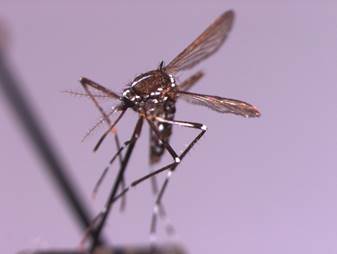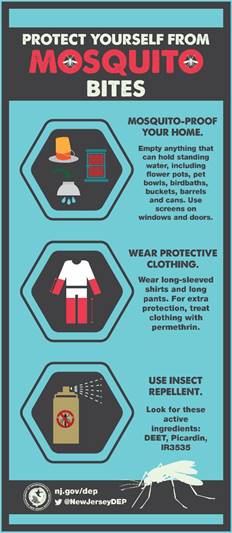|
FOR IMMEDIATE RELEASE |
Contact: Lawrence Hajna (609) 984-1795 |
|
NEW JERSEY MOSQUITO CONTROL COMMISSION MARKS 500th MEETING WITH SIMPLE MESSAGE: (19/P033) TRENTON – As the New Jersey Mosquito Control Commission marks its 500th meeting and as mosquito season gets underway, the Department of Environmental Protection, Department of Health and Department of Agriculture remind the public of the ongoing importance of controlling populations of the disease-carrying insect.
The commission’s 500th meeting was held today at the New Jersey Department of Health and Agriculture building in Trenton. In addition to monitoring and controlling populations of mosquitoes that carry West Nile virus, the state-led effort remains vigilant in addressing equine encephalitis, a rare but very serious disease, and emerging threats such as Zika. With continued wet weather this spring, it is critical that residents do their part to address mosquito threats around their own properties as the mosquito season begins. Last year, New Jersey reported its highest number of West Nile virus cases, with more than 60 cases identified in 20 counties. “You can protect yourself and your family from mosquito-borne diseases by wearing long sleeves and pants, using EPA-registered insect repellent and treating clothing and outdoor gear with permethrin,” said Health Commissioner Dr. Shereef Elnahal. “If you’re planning a trip overseas, check the U.S. Centers for Disease Control and Prevention Traveler’s website to find out about mosquito-borne disease risks and then take steps to prevent mosquito bites while traveling and for three weeks once you’re back in New Jersey.” The New Jersey Mosquito Control Commission was founded in 1956 to protect the public from nuisance mosquitoes and the threat of mosquito-borne disease. It works closely with all 21 county mosquito control agencies, the Rutgers Agricultural Experiment Station, the Department of Health and the Department of Agriculture on coordinated control efforts. Among its functions, the commission recommends to the Governor and Legislature changes in state laws needed to protect public health and carry out efficient mosquito-control efforts throughout the state. Further, it strives to ensure the use of only the most environmentally safe and efficient mosquito techniques, products and programs and oversees an environmentally-sound aerial application program. The commission reviews municipal and county mosquito control programs and projects to ensure their compliance with state and federal regulations and policies. It also supports the training of county mosquito control personnel as well as the education of the public on mosquito biology, surveillance, and the various chemical, biological and water-management techniques and practices used in the state's abatement efforts. Membership on the commission includes six public members and four state officials. The Governor, with the advice and consent of the Senate, appoints the public members who serve for four-year terms. Ex officio members include the Commissioners of the Department of Health, and Department of Environmental Protection, the Secretary of the Department of Agriculture, and the Director of the New Jersey Agricultural Experiment Station. New Jersey’s 21 county mosquito control agencies use a variety of methods to combat mosquitoes, including public awareness campaigns, targeted larval habitat source-reduction programs, use of natural predators such as mosquito-eating fish, and judicious application of EPA- and DEP-approved insecticides by ground and aerial means. Early season mosquito activity has begun. Testing will start soon for a variety of pathogens spread by mosquito bites, including Eastern equine encephalitis and West Nile virus, which are routinely found circulating within mosquito populations in New Jersey. “The New Jersey Mosquito Control Commission has played a vital role in helping protect humans and animals from mosquitoes and the diseases mosquitoes can spread,” New Jersey Secretary of Agriculture Douglas Fisher said. “The Department of Agriculture encourages animal owners to be vigilant in vaccinating their animals against diseases spread by mosquitoes. Vaccinated animals are much less likely to contract deadly diseases such as Eastern equine encephalitis and West Nile virus.” Even with dry weather, diseases can be spread as mosquitoes and birds share the same water sources, making it even more important for the public to remove sources of standing water in their yards that can serve as mosquito breeding grounds. The commission recommends residents take the following steps to protect themselves and their families:
This state-county network is engaged in critical information sharing so that county partners can investigate any emerging mosquito-borne virus activity and take needed action where appropriate. Likewise, county programs share both mosquito population data and mosquito species samples taken each day throughout the season. These data are compiled into regional reports and analyzed by the Rutgers Agricultural Experiment Station for decisions made by the commission, the DEP and the counties. New Jersey has more than 60 different kinds of mosquitoes, 20 of which can carry diseases. During the 2018 season, surveillance programs documented above average mosquito populations and record-setting levels of West Nile virus in mosquitoes with more than 1,330 positive samples. The season generally lasts well into the first frosts of fall. To learn more about the New Jersey Mosquito Control Commission and for links to county mosquito agencies, visit www.nj.gov/dep/mosquito For more information on how to prevent mosquito bites and illness, or to mosquito-proof your home and yard, visit http://nj.gov/health/cd/documents/faq/mosquito_checklist.pdf or http://nj.gov/health/cd/documents/topics/vectorborne/C2506–Mosquito-borne%20Diseases%20Brochure.pdf Media note: Additional photos and a JPG of the prevention graphic are available upon request |
|
 “The Mosquito Control Commission oversees several longstanding programs designed to provide state assistance directly to county mosquito-control programs,” DEP Commissioner Catherine R. McCabe said. “This assistance helps them to deliver targeted, science-based and environmentally sound mosquito-control services to the public. We are very fortunate to have the commission and dedicated staff at the state and county levels who are working hard every day to protect public health.”
“The Mosquito Control Commission oversees several longstanding programs designed to provide state assistance directly to county mosquito-control programs,” DEP Commissioner Catherine R. McCabe said. “This assistance helps them to deliver targeted, science-based and environmentally sound mosquito-control services to the public. We are very fortunate to have the commission and dedicated staff at the state and county levels who are working hard every day to protect public health.” This summer, the Department of Health expects to launch a new social media campaign, #FightTheBiteNJ, to further educate the public about the health dangers of mosquitoes and the steps they can take to reduce populations, Dr. Elnahal added.
This summer, the Department of Health expects to launch a new social media campaign, #FightTheBiteNJ, to further educate the public about the health dangers of mosquitoes and the steps they can take to reduce populations, Dr. Elnahal added.